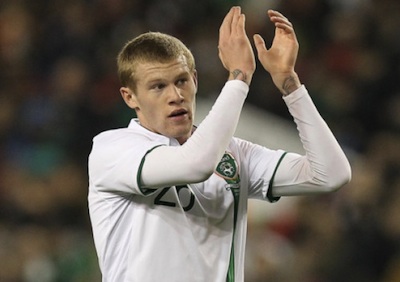
There has been praise for an Irish soccer player who refused to bow to pressure to wear a poppy, the symbol of the British Army’s war dead, on Remembrance Sunday.
In recent years, ‘poppy fascism’ has increasingly been used by British nationalist extremists and the right-wing media to carry out a witch-hunt against those public figures who do not share their views.
Derry man James McClean, who plays for English football team Wigan FC, was forced to issue a statement to explain why he did not wear a poppy-embroidered shirt like the rest of his teammates.
Soccer players across the north and Britain were required to wear poppies on their jerseys to commemorate Remembrance Sunday, which falls on the anniversary of the outbreak of the First World War.
The 25-year-old Irish international, who was subjected to online abuse after he did not wear a poppy last year, explained his decision in a letter published on Wigan Athletic’s website before last night’s Championship game against Bolton Wanderers.
In the letter, addressed to Wigan chairman Dave Whelan, McClean said he had “complete respect for those who fought and died in both World Wars - many I know were Irish-born”.
But he said the poppy is also used to remember British soldiers killed in other conflicts, including in the north of Ireland.
“For people from the North of Ireland such as myself, and specifically those in Derry, scene of the 1972 Bloody Sunday massacre, the poppy has come to mean something very different,” he said.
He wrote: “Please understand, Mr Whelan, when you come from Creggan like myself or the Bogside, Brandywell or the majority of places in Derry, every person still lives in the shadow of one of the darkest days in Ireland’s history - even if, like me, you were born nearly 20 years after the event.
“It is just a part of who we are, ingrained into us from birth.
“Mr Whelan, for me to wear a poppy would be as much a gesture of disrespect for the innocent people who lost their lives in the Troubles - and Bloody Sunday especially - as I have in the past been accused of disrespecting the victims of WWI and WWII.
“It would be seen as an act of disrespect to those people; to my people.
“I am not a war monger, or anti-British, or a terrorist or any of the accusations levelled at me in the past. I am a peaceful guy, I believe everyone should live side by side, whatever their religious or political beliefs which I respect and ask for people to respect mine in return. Since last year I am a father and I want my daughter to grow up in a peaceful world, like any parent.
“I am very proud of where I come from and I just cannot do something that I believe is wrong. In life, if you’re a man you should stand up for what you believe in.”
This year, reaction on social media was largely supportive.
Sinn Fein politician Mr McGuinness tweeted on Monday to say: “James McClean - thoughtful, respectful and dignified. A credit.”
COMMEMORATIONS
Meanwhile, Irish politicians have participated in Remembrance Sunday events on a larger scale than previous years.
There was Irish participation in services of remembrance in Dublin, the north of Ireland and London on Sunday, with Taoiseach Enda Kenny attending a commemoration at Enniskillen.
In London, a wreath was laid at the Cenotaph by Irish Ambassador Daniel Mulhall, in Belfast, Mayor Nichola Mallon led the memorial and 26-County Foreign Affairs Minister Charlie Flanagan attended, alongside First Minister Peter Robinson.
At the event in Dublin, former Sinn Fein councillor and current Mayor Christy Burke defended his attendance to a small group of protestors.
“What do you want me to do?,” Burke told them, after his driver pulled up to the event. “I commemorate all men and women. The Good Friday Agreement proved that.”
Donning the chains of office, he continued, “You’re dealing with someone who has been in jail, an IRA volunteer, on the run and involved in the struggle from start to finish, so don’t go there with me. It’s as simple as that,” adding, “Martin McGuinness shook hands with the queen.”
![[Irish Republican News]](https://republican-news.org/graphics/title_gifs/rn.gif)
![[Irish Republican News]](https://republican-news.org/graphics/title_gifs/harp.gif)

